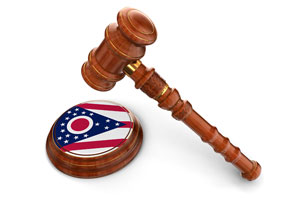Ronald Boasten was convicted of murdering his ex-wife, Brandi. They married after Brandi became pregnant and soon divorced after she had an affair. The couple reconciled and had another child together but did not remarry.
Several years after they reconciled, Ronald suspected that Brandi was having another affair. After Ronald placed spyware on Brandi’s mobile phone, Brandi moved out of their home. She returned every day, however, to spend time with their children.
Ronald continued to monitor Brandi’s texts with the spyware he installed on her phone. After reading a series of suggestive texts, Ronald borrowed a gun from a friend. Ronald said he wanted to take care of a problem but did not mention Brandi.
The day after Ronald borrowed the gun, a hunter found Brandi’s SUV parked in a field with its engine running. The police discovered Brandi’s body in the SUV’s cargo area. A forensic pathologist determined that she had been strangled.
None of Ronald’s DNA was found on the body or in the SUV. A hair from Brandi’s head was found on a buckle on one of Ronald’s gloves. However, since Ronald and Brandi had been together for years, the hair was far from conclusive evidence of Ronald’s guilt.
Autopsy Report
A forensic pathologist autopsied Brandi’s body. She determined a time of death based on stomach contents. While the pathologist prepared a report that described the autopsy and offered an opinion as to the cause of death, the autopsy report included no opinion regarding the time of death.
The pathologist placed the buckle on Ronald’s glove against an abrasion on Brandi’s face and determined that the abrasion was “consistent with” the buckle and Velcro on Ronald’s glove. The autopsy report said nothing about the purported “consistency” between the glove buckle and the mark on Brandi’s face.
The pathologist mentioned her opinion about the glove buckle during a meeting with Brandi’s lawyer 19 days before trial. During the meeting, she also offered an opinion about the time of death. Brandi’s lawyer told the prosecutor that the autopsy report should be supplemented with this undisclosed information. The prosecutor declined to do so.
Failure to Disclose Expert Opinion Prior to Trial
Rule 16(K) of the Ohio Rules of Criminal Procedure requires an expert witness for either side in a criminal prosecution to “prepare a written report summarizing the expert witness’s testimony, findings, analysis, conclusions, or opinion.” The report must be disclosed no later than 21 days before trial. Failure to make the required disclosure “shall preclude the expert’s testimony at trial.”
The prosecution clearly violated discovery rules by failing to disclose two important expert opinions in a written report 21 days before the trial: time of death and alleged consistency between an abrasion and the buckle on Ronald’s glove. Ronald’s lawyer moved to exclude those opinions because that is the remedy for nondisclosure that Rule 16(K) requires.
The trial judge nevertheless admitted the opinions because defense counsel had the autopsy report that omitted those opinions a year before the trial and “chose” to meet with the pathologist 19 days before trial. Neither of those facts speak to the prosecution’s failure to follow the rule.
The court of appeals affirmed that ruling because courts are given “broad discretion” to make evidentiary rulings. However, courts have no discretion to make legally incorrect rulings. The Ohio Supreme Court therefore accepted review to determine whether a failure to disclose expert opinions 21 days before trial should result in exclusion of those opinions.
Appellate Analysis
Rule 16(K) allows the court to modify the 21-day deadline for good cause if the modification is not prejudicial. If the prosecution had asked the trial court in advance of trial to permit the late filing of a supplemental report, it might have cured the problem. Instead, prosecutors arrogantly refused to produce a supplemental report and did not ask for the deadline to be modified. Why prosecutors should be rewarded for flouting discovery rules is unclear.
The state supreme court noted a split in lower court decisions about whether Rule 16(K) means what it says. The text of the rule is written in absolute terms. The rule gives courts discretion to amend the disclosure deadline for good cause, but it grants no discretion to admit exert opinions that have never been disclosed in a written report. The supreme court concluded that “if a court rule is unambiguous, it is to be applied as written.”
Lessons Learned
The trial court erred by admitting the expert opinions that were not included in the written autopsy report. Having made the correct decision, the supreme court then upheld the conviction, ruling that the error was harmless because the defense lawyer knew about the expert’s opinions before trial and was able to cross-examine the expert about them.
The holding essentially nullifies Rule 16(K). The harmless error analysis does not depend on whether the defense cross-examined the expert, but on whether the trial outcome might have been different if the improperly admitted evidence had been excluded. Given the circumstantial nature of the evidence linking Ronald to the crime, it is difficult to conclude that evidence purporting to match Ronald’s glove to the wound on Brandi’s face did not influence the verdict.
Perhaps the defense should have anticipated that the trial judge would ignore Rule 16(K) and should have hired an expert to explain why the mark on Brandi’s face could have been caused by any number of objects. For the same reason that bite mark evidence is unreliable, an eyeballed opinion that Ronald’s glove buckle was consistent with the abrasion is not based on sound science. The lesson to learn is that defense lawyers should always be prepared to call an expert to challenge a prosecution expert, particularly when the prosecution is relying on doubtful expert opinions.




